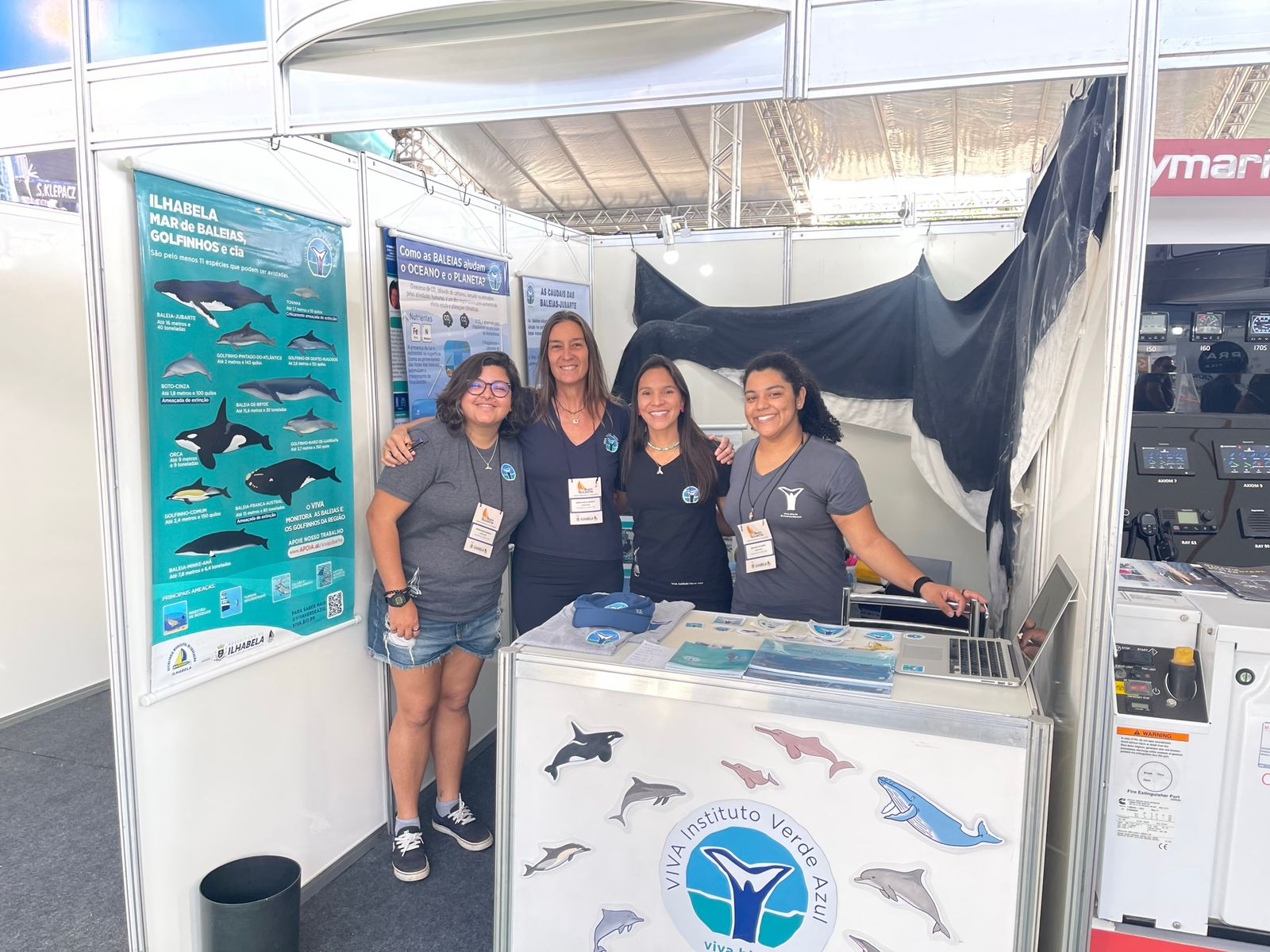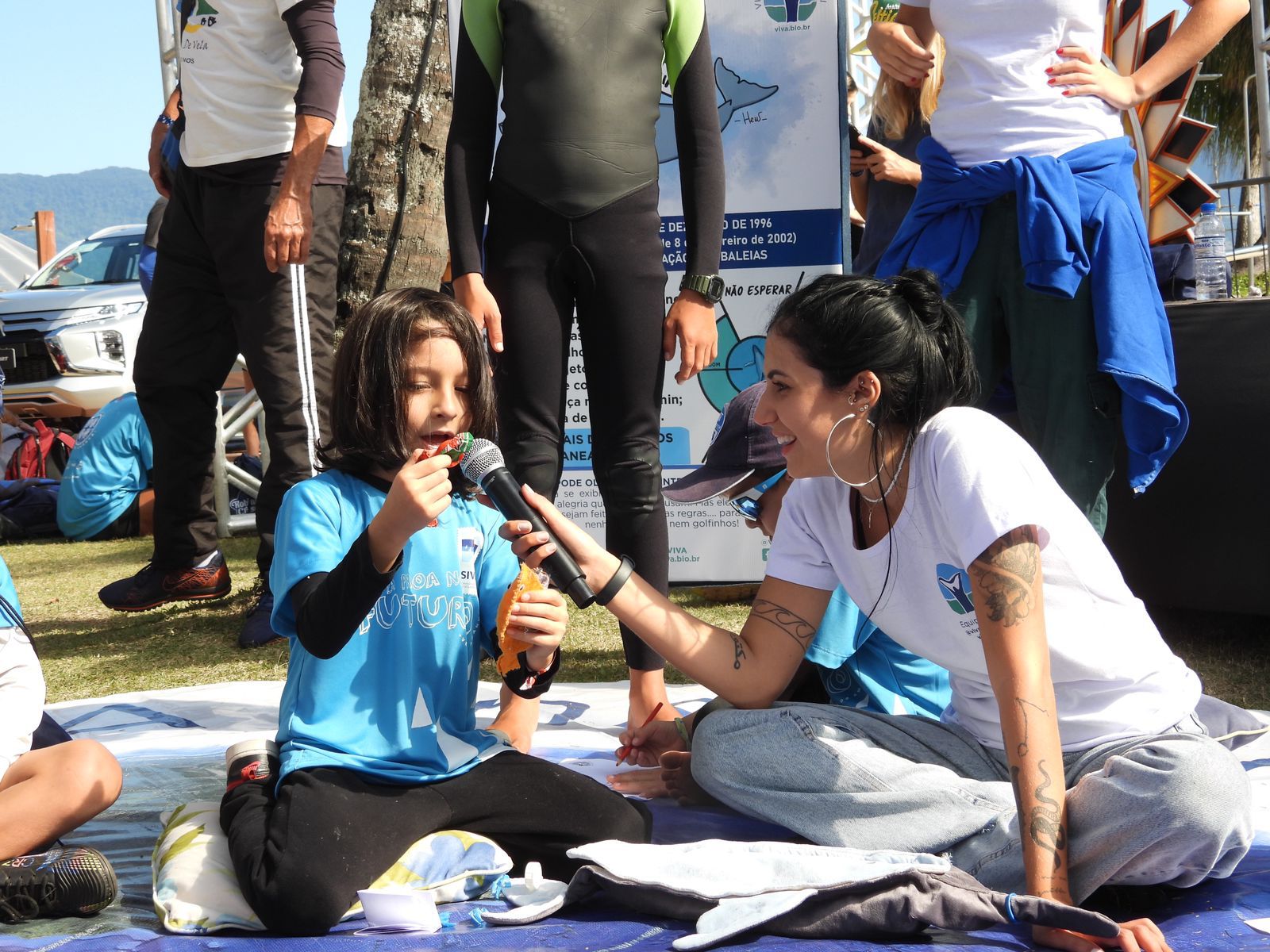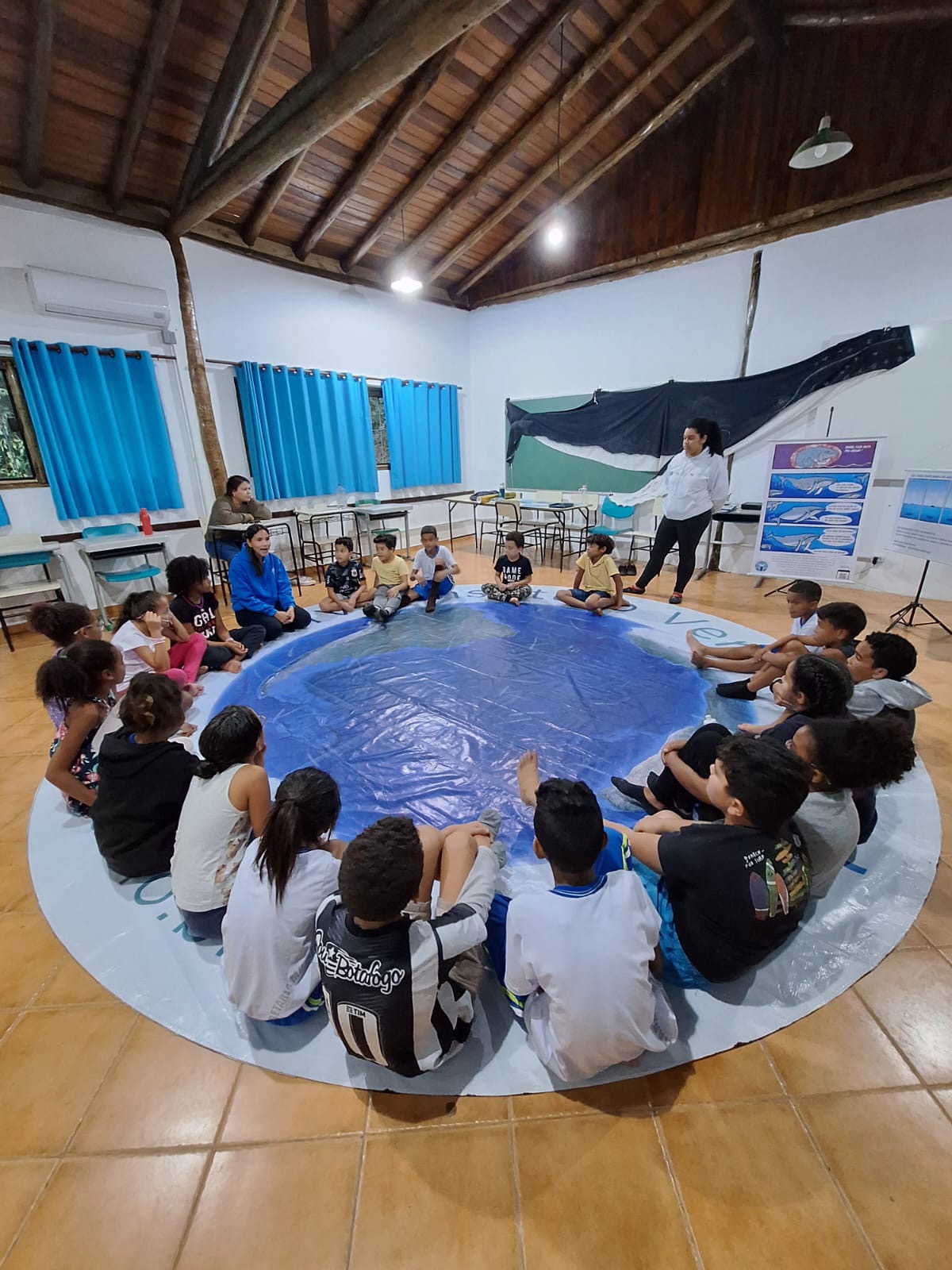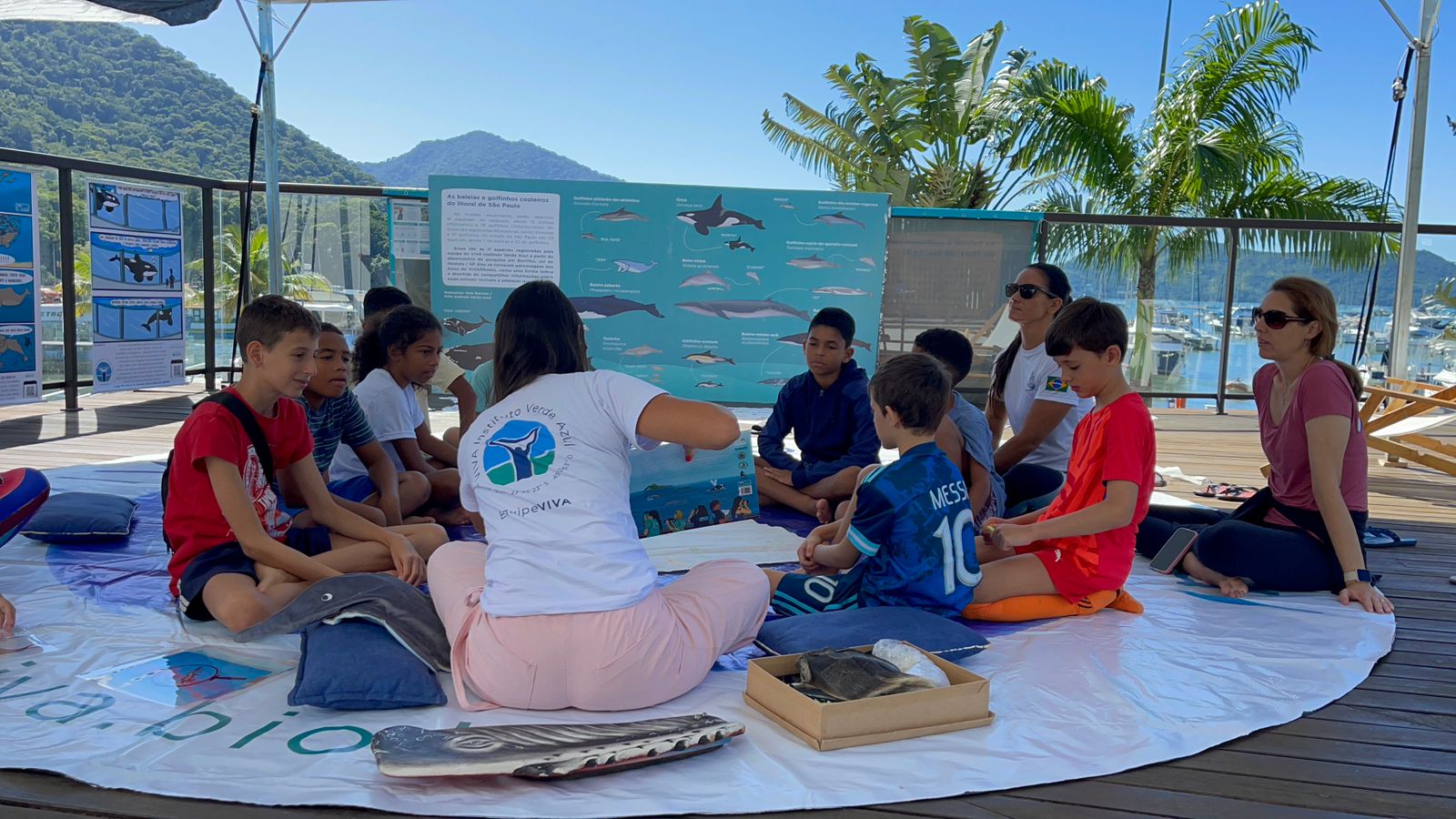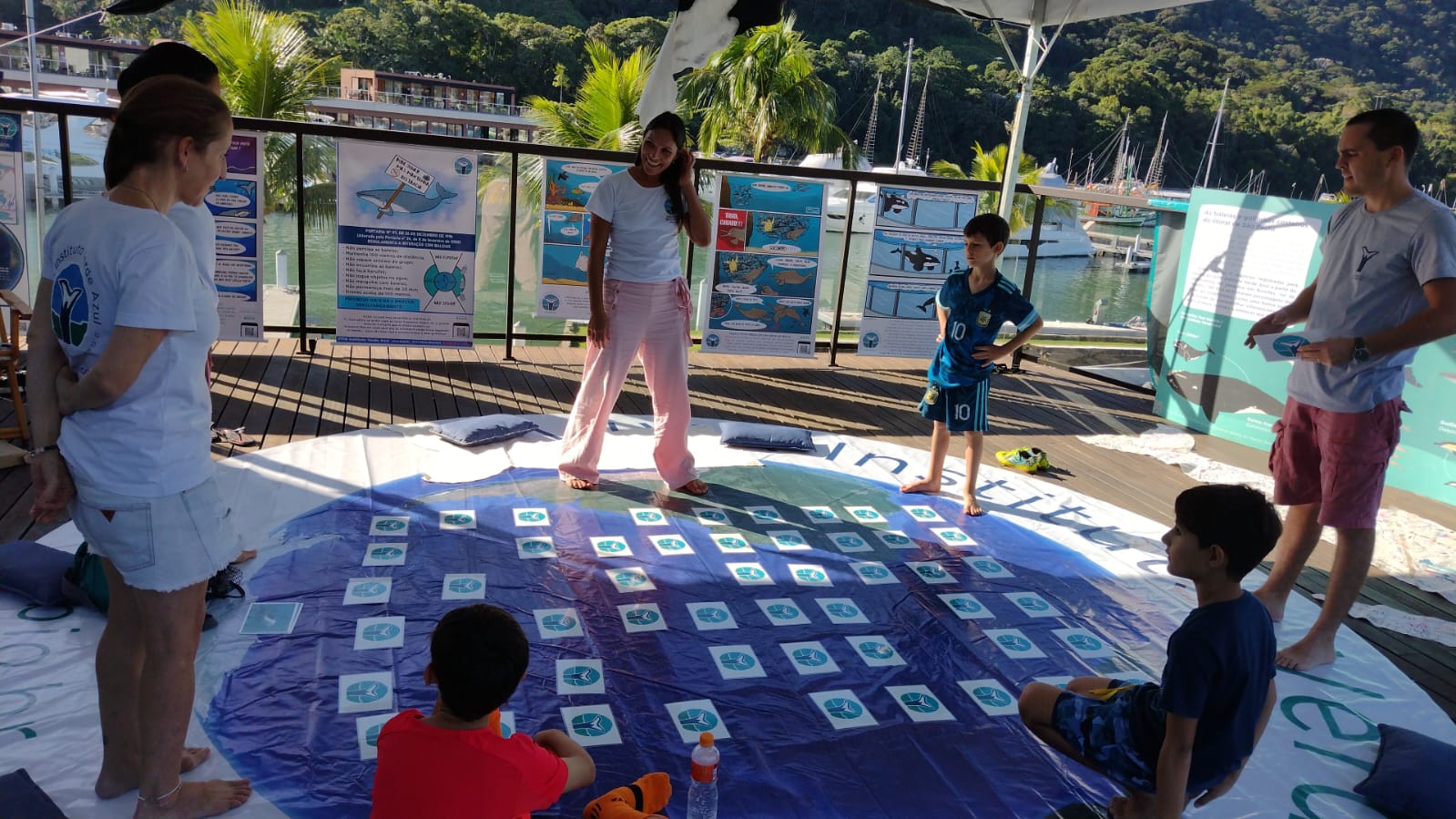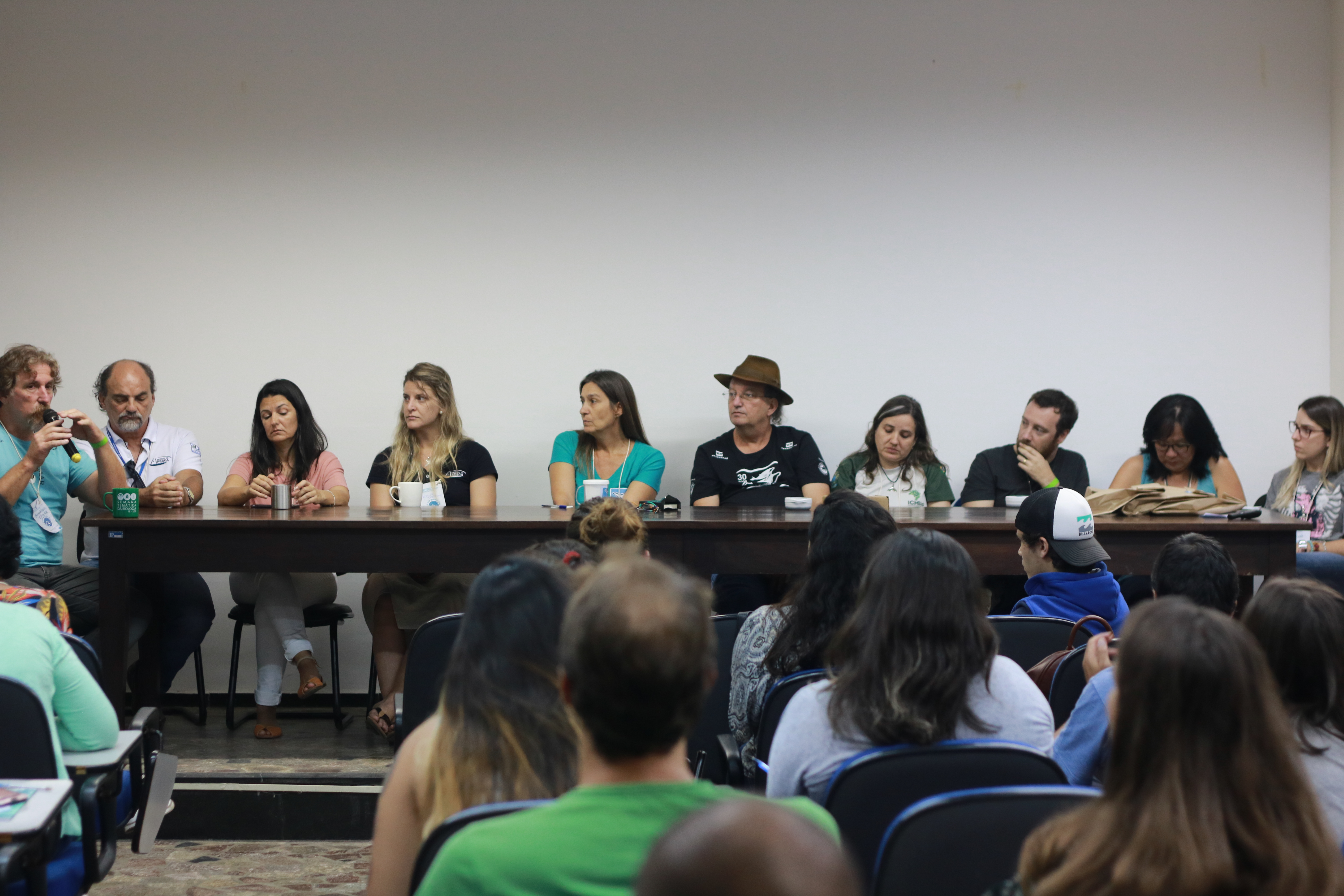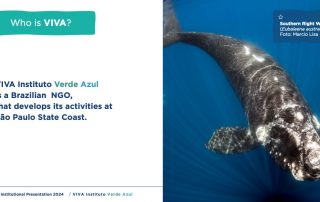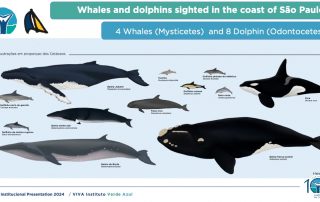VIVA Verde Azul Institute
The VIVA Verde Azul Institute (formerly known as VIVA Baleias Golfinhos e cia) was born from the desire to educate people about the beauty, intelligence, and mysteries of whales, dolphins, and other animals. It also arises from the need to spread awareness of the truths about how these animals are exploited, how they suffer for entertainment and human use in aquariums and parks, how some populations are being decimated, entangled in fishing nets, how various types of pollution affect their existence, and how and why they are still hunted. The VIVA team believes that people only care for and protect what they know and admire. Therefore, in this way, we can raise environmental awareness in people, promoting actions to preserve these animals and their habitats.
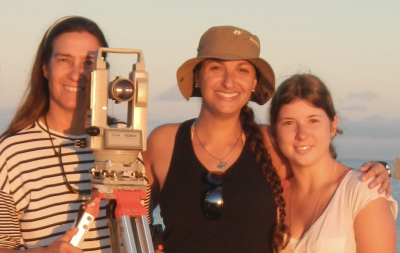
The VIVA Verde Azul Institute was idealized and created by three biologists passionate about marine life, specialists in cetaceans: Daniela Abras, a marine biologist graduated from UFRJ and with a master’s degree in Biological Oceanography from the Oceanographic Institute of USP. Dani worked for 2 years at the Baleia Jubarte Institute as a researcher, dedicating herself intensely and daily to VIVA for 3 years. Currently, she works as an expedition guide in the Antarctic region and tropical regions, teaching in real-time, about the beauties and mysteries of marine animals. Julia Dombroski had a brief involvement in the conception of VIVA. And Maria Emilia Morete, also known as Mia, continues to be part of the team.
Mission, Vision and Values
To contribute to the conservation of marine mammals and their habitats, in an ethical and responsible manner, by educating, raising awareness, and sensitizing humans. This involves highlighting the threats and challenges these animals face, conducting research, and seeking solutions to protect and sustain them on the planet.
To act globally and effectively, contributing to the conservation of marine mammals, conducting research, supporting students and young researchers, disseminating scientific information to promote changes in human attitudes in favor of these species and their habitats.
Value all forms of life.
ETHICS: Be ethical with both humans and non-human beings.
RESPONSIBILITY: Be responsible for the information conveyed and agreements established.
SUSTAINABILITY: Adopt attitudes and behaviors that aim to reduce our impact on the planet.
RESPECT: Respect collaborators, partners, and supporters.
COLLABORATION: Teamwork
Our Team
Maria Emília Morete (Mia)
Since childhood, her dream was to “save the whales,” as she watched cruel images of the killings on TV, since it was a time when hunting was still allowed in Brazil! In 1986, at the age of 16, she began her life as an activist and participated in a demonstration on Avenida Paulista calling for an end to whaling! She pursued her dream… She is a biologist graduated from the Universidade de São Paulo and holds a Ph.D. in Ecology from the Department of Ecology at the Institute of Biosciences at USP. She worked for 9 years at the Instituto Baleia Jubarte (IBJ) in Abrolhos, conducting behavioral observation studies of humpback whales in the region around the archipelago, using a non-invasive fixed-point observation method, which allowed her to develop her thesis. She is still an associated researcher at the Humpback Whale Institute, returning annually to Abrolhos to train the field team at the beginning of the whale breeding season.Throughout her life, she has been involved in research projects associated with the United States government (NOAA), participated in a Scientific Expedition to Antarctica, and has been a speaker at conferences in the areas of marine mammals, zoology, ecology, and animal ethics. She is the author and co-author of scientific papers and book chapters. She founded VIVA Baleias, Golfinhos e cia (now VIVA Verde e Azul Institute) still with the great desire and hope to save whales, dolphins, and all the precious biodiversity of the Earth from the significant anthropogenic pressures they face, through the dissemination of knowledge and awareness. Out of respect and love for animals, she is a vegan and an activist… And a “nagging” mother who wants to leave an ethical, upright human being who loves and respects animals to the planet!
Marina Leite Marques
Her connection with the sea and the animals that live in it began at a very young age. Even though she lived in a city like São Paulo, her parents always ensured frequent contact with the sea. On one of these trips, at the age of 8, she experienced crystal-clear dives and saw hundreds of incredible animals up close, sparking her curiosity and care for them. She chose the Biological Sciences course with an emphasis on Marine Biology. Graduating from Santa Cecília University, she completed both the Teaching and Bachelor’s degrees in 2004. For eight years, she worked as a monitor and project manager in clinical research studies. However, her passion for the sea prevailed, and she decided to dedicate herself to animals. She worked for two years as a temporary researcher at the Humpback Whale Institute, coordinating the Fixed Point in Abrolhos and serving as an on-board observer of cetaceans in the region of the Abrolhos Banks. She has been trained and monitors the reproductive monitoring of sea turtles in Abrolhos since 2014. With experience in Zoology and Environmental Education, focusing on Conservation of Animal Species, she is currently a collaborating researcher at VIVA Verde Azul Institute.
Hew Barreto
Graduated in Biological Sciences from the Federal University of Alagoas (Ufal). She interned at the Instituto Baleia Jubarte in 2015, where she conducted activities monitoring humpback whales in the Abrolhos Marine National Park from a fixed point and participated in whale watching. In addition to monitoring other species such as gray dolphins and sea turtles. Since 2019, she has been working as a field researcher, participating in research and education activities developed by VIVA Verde Azul Institute. Passionate about comics, she contributes to the creation of educational materials, producing illustrations and comic strips focused on scientific dissemination, environmental education, and conservation. She is also a co-author of the two illustrated books published by VIVA.
Márcio Motta
Biologist graduated from the Catholic University of Santos and Master of Biological Sciences from the State University of Londrina. Pedagogue graduated from Senac University Center. Currently, he is a Ph.D. candidate in the Postgraduate Program in Biodiversity of Coastal Environments at Unesp (Campus Litoral Paulista) and a member of the team at VIVA Verde Azul Institute.
Letícia Andrade
Marine biologist graduated from the University of Algarve in Portugal and postgraduate in Zoology. She volunteered at VIVA for 7 months, where she fell even more in love with the conservation of whales and dolphins. Currently, she works monitoring at the institute’s fixed point and with environmental education.

Current projects
The VIVA Instituto Verde Azul works on various projects and formats to achieve these goals.
It conducts RESEARCH and EDUCATION with the aim of conserving whales and dolphins and their habitats.

Ilhabela, a sea of whales, dolphins, and company.
The VIVA Verde Azul Institute began its research in Ilhabela, on the north coast of São Paulo, monitoring humpback whales (Megaptera novaeangliae), commonly seen in the region during their breeding season.
In June and July 2019, we spent 50 days conducting a pilot study in the Ilhabela region, SP, intending to understand what the Humpback Whales are doing in the area. We obtained incredible information about these whales and also observed the presence of various other dolphin species, including the amazing orcas (Orcinus orca)!
This region has a great diversity of cetaceans in its waters. Nine species are frequently sighted, and others are observed sporadically. Among the mysticetes: humpback whale (Megaptera novaeangliae), Bryde’s whale (Balaenoptera brydei), and southern right whale (Eubalaena australis). Among the odontocetes: killer whale (Orcinus orca), gray dolphin (Sotalia guianensis), franciscana dolphins (Pontoporia blainvillei), rough-toothed dolphin (Steno bredanensis), Atlantic spotted dolphin (Stenella frontalis), and bottlenose dolphin (Tursiops truncatus). Some of these species are residents and can be observed throughout the year, while others are migratory and can be seen during a certain period.
From there, we found that the Ilhabela region is very important for these animals, and given the intense anthropogenic activity in the area, studies and conservation efforts for these animals must be continuous. To support this extensive research, we continue our campaign on (support)
Our main goal is to know and understand which whales and dolphins are in the area and how they are impacted by significant anthropogenic influences.

Environmental Education
Environmental Education is a powerful tool for raising awareness and sensitizing individuals through education and information. In addition to all the facets embraced by VIVA, such as research, scientific dissemination, among others, EE is present in our daily efforts to reach children and adults in a way that brings them closer to conservation, so that individual actions can make a difference on the overall.
VIVA works in schools, gives lectures at open events, and conducts courses and training for students, tour guides, and sailors on cetaceans and the threats they face. It has conducted two training sessions for teams in São Paulo on whale disentanglement
Our journey began with the publication of two exclusive books: “Whales, Dolphins, and Co” and “São Paulo, Sea of whales, Dolphins, and Co – an illustrated guide.” These works serve as valuable tools for our activities with students of different age groups. The project has been warmly received, and in partnership with the Ilhabela City Hall, we have made the digital files of the books available for free printing and distribution throughout the municipal education network.
To ensure the success of activities in municipal schools, we developed an action plan in collaboration with the Secretary of Education, Lídia Sarmento. All educators involved in Ilhabela’s municipal schools, including general coordinators, directors, and teachers, embraced the theme of whales and dolphins. In this way, we were able to reach students in diverse and efficient ways.
In early 2022, we signed a Cooperation Agreement with the City Hall of Ilhabela for the implementation of the project “Ilhabela, Sea of Whales, Dolphins, and Co.” The aim of this project was to consolidate the partnership established in the previous year, conducting activities in Ilhabela’s Municipal Public Education System throughout the 2022 school year. These activities were also extended to the surrounding traditional communities, aiming to involve and sensitize everyone. To access the complete report, click here.
In 2023, we have already reached all children enrolled in phases 1 and 2 of early childhood education and in the 1st grade of elementary school in Ilhabela’s city schools, totaling more than 3,200 students. We remain committed to bringing knowledge and fascination for cetaceans to all students and citizens.
Women students support

As a way to promote studies on cetaceans, VIVA also offers scholarships for undergraduate or graduate students in biological areas conducting research on cetaceans. Annual scholarships include the grants VIVA Juliana Molás, VIVAToninha, Stop Bycatch and VIVAGrant, which provides financial support for field research or participation in conferences.
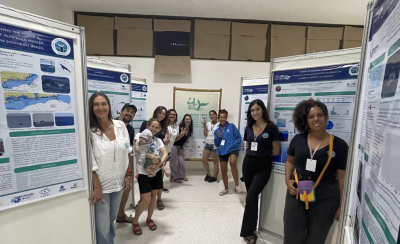
Internship and Volunteering
Ilhabela is very special! At least 11 species of whales and dolphins have already been sighted in the coastal region! Ilhabela, Sea of Whales, Dolphins, and Company” is the research and education project developed by VIVA Instituto Verde Azul.
Since 2019, VIVA has been researching the cetaceans in the region from an observatory in Borrifos neighborhood, southern Ilhabela, SP. Since 2021, it has been conducting activities with children from municipal schools in Ilhabela. It’s important that Ilhabela and the surrounding region residents get to know and engage in the studies of these incredible animals. Therefore, VIVA is looking for interns and volunteers living in Ilhabela and the surrounding region to be part of this work.
Active campaigns
Stop Bycatch Day
Bycatch (accidental captures) pose a serious threat to the entire aquatic ecosystem and represent a significant challenge in the management of these environments. In light of this, VIVA Verde Azul Institute conceived the International STOP Bycatch Day, which takes place on December 1st. The main goal is to raise awareness in society about the issue, its dimensions, and consequences – both social and ecological – and to discuss ways to monitor and reduce these captures. Beyond experts, the focus is to reach and involve students, fishermen and fisherwomen, public agencies, decision-makers, and the general population.
Empty the Tanks
The VIVA Verde Azul Institute identifies and participates in two international movements: Empty the Tanks and Japan Dolphins Day. Both are interconnected, as the cruel hunting and capture of dolphins at Taiji, in Japan for six months each year, supply dolphins to aquariums worldwide where they are enslaved for performances in tanks and marine parks. The most effective way to protest against these cruelties is by not purchasing tickets for these parks and shows!
Stop Taiji
Every year, from September 1 to March 1, a large-scale hunt of dolphins takes place in the small village of Taiji, Japan, as portrayed in the 2010 Oscar-winning documentary, The Cove. During this six-month season, dolphin hunters employ hunting techniques to drive many dolphins to the shore, resulting in their capture and/or death. Captured dolphins may be selected for aquariums and marine parks for exhibition, while others are slaughtered for their meat. The price of live captures is higher than that of animals intended for meat marketing.
Actions and Public Policies
VIVA contributes with technical-scientific information in meetings and working groups of the Environmental Protection Areas (APAs) in São Paulo. We, at VIVA, believe that we should work together with various stakeholders in the community for the conservation of these animals and their habitats. We need to integrate technical-scientific knowledge and education to support actions and public policies for protection in the territories.
More about us


